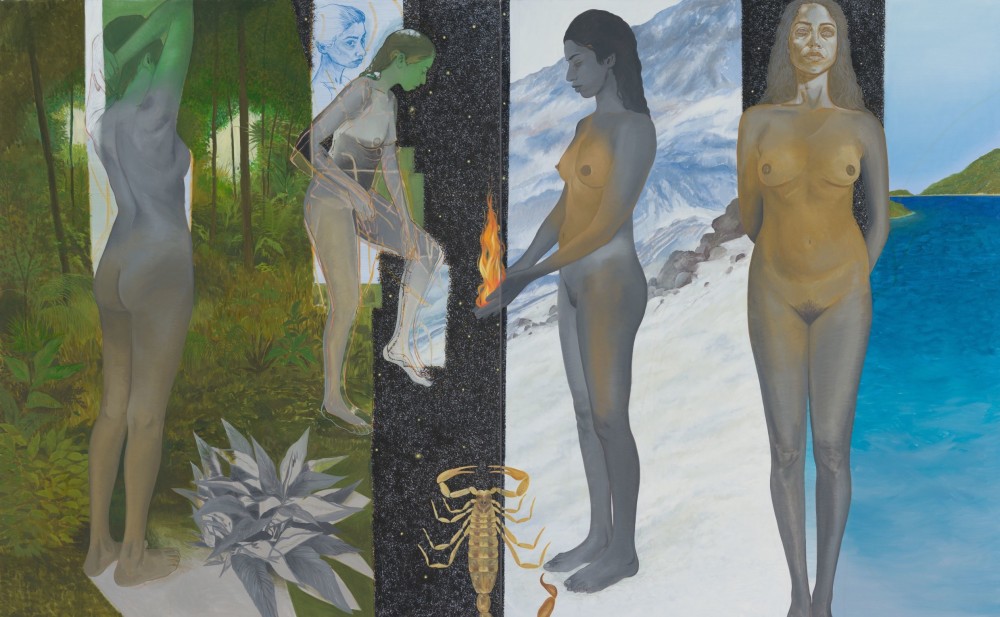
Nadia Waheed: A Strange Icarus
Nadia Waheed creates portals, not paintings. In A Strange Icarus, her first solo exhibition with Nicodim, Waheed ushers us into a transitional space that compels us to meditate on the timelessness to ourselves and the universe. Why is it that we have always turned our faces to the stars? Why is every culture founded upon an attempt to make meaning of our birth, death, and its aftermath? Pondering such questions, Waheed has brought into the world a series of works that explore the most ancient parts of ourselves, the pieces that remember the wonder of the first sunrise, the oldest wound, the enduring ache of human suffering across the ages. She reminds us that we do not exist only and entirely in the present, with our immediate cares and pleasures. We are always creatures of primordial origins imagining eternity in various guises, pondering age-old questions that gather evermore intricate and befuddling layers of meaning–consumption, innovation, theorization.
In this search for the immensity of our ancestry Waheed brings us to the body. The body is not a given, taken for granted thing in her works. Skeletal, celestial, cartographic, fleshy, ethereal–the various figurations of the human body that inhabit these paintings imagine the corporeal in all its simultaneous possibilities. One can almost feel the intensity of the artist’s focus on rendering the body in infinite detail, in a complex chiaroscuro that imbues figures with a three-dimensional, almost sculptural quality. Waheed’s interest in the history of the body spans the history of the visual arts. Three Primes (2023) is a composition of four figures that is reminiscent of Matisse’s seminal Bathers by a River, A Fundamental Archetype (2023) is a prostrate body from whose womb springs a reimagining of the Assyrian Tree of Life. Science constitutes one of the many genealogies the artist turns to in her search for truth, as evidenced by references to Renaissance-era sketches of the body reminiscent of Titian or Da Vinci or 17th century Dutch anatomist Bernhardus Albinus’ detailed illustrations. Despite these influences, her paintings do not reproduce the classical tradition’s assumption of the white male as universal or ideal. The invocation of the artist’s own form illustrates how autobiography is an incomprehensive yet meaningful history of existence. This juxtaposition of the personal and the cosmic allows us to imagine a different universal, one that does not dissolve difference–of race, class, gender and so on–yet insists on the fundamental humanness, and so commonality, of individuality.
These bodies bear an intimate relationship to their environments, binding the internal to the external. By virtue of illustrating this connection between interiority and exteriority Waheed forestalls any attempt to read her work as only portraiture, extending her reach to landscape painting. Her idyllic and fabular landscapes traverse the history of landscape art, with nods to specific works such as Frederic Edwin Church’s Rainy Season in the Tropics (1866). However, these influences are never singular nor direct; Waheed’s process of searching through many archives simultaneously results in every reference existing as an assemblage, as can be seen in her marriage of René Magritte’s fixation on landscapes glimpsed through windows with her view of an African tulip tree (Spathodea campanulate) that flowers daily outside the bathroom window at her uncle’s house in Karachi, Pakistan. Meanwhile, the various climates depicted index the body that has traveled to the farthest reaches of the planet and universe, along historical and spiritual routes of exploration, expansion, migration. These settings are allegorical as well, prompting the viewer to consider where the body resides in the landscape of Being.
Nadia Waheed (b. 1992, Saudi Arabia) lives and works in Austin, TX. She graduated with a BFA in Painting & Drawing from The School of the Art Institute of Chicago in 2015. Recent exhibitions include: A Strange Icarus, Nicodim, Los Angeles (2023, solo, forthcoming); MATERNITY LEAVE: NONE OF WOMEN BORN, Nicodim in collaboration with the Green Family Foundation, Dallas, DISEMBODIED, Nicodim, New York (2023); Wonder Women II, Jeffrey Deitch, Los Angeles (2022); Heavy Bend, Gallery 1957, London (2022, solo); YOU ME ME YOU, Nicodim, Los Angeles (2022); Wonder Women, Jeffrey Deitch, New York (2022); Madeleine Bialke, M. Florine Démosthène, Sahara Longe, Nadia Waheed, Alexander Berggruen, New York (2022); Am I Human Yet, Arsenal Contemporary New York (2021, solo); I Climb, I Backtrack, I Float, Mindy Solomon Gallery, Miami (2020, solo); Sacred Vessel (pt.2), Arsenal Contemporary, New York (2020); Crossroads, Patel Gallery, Toronto (2020).